5 of Late Zagreb Mayor's Associates Convicted, Pripuz Acquitted in Agram Graft
ZAGREB, 9 June 2022 - Five close associates of late Zagreb Mayor Milan Bandic were sentenced on Thursday to between 7 and 14 months in prison in the graft case dubbed Agram, while the principal defendant, businessman Petar Pripuz was acquitted of all charges.
The former chief of staff of Bandic's office, Miro Laco, was given the highest sentence of 14 months for illegal employment and use of official cars.
Former director of the city's ZET public transport company, Ivan Tolić, was sentenced to nine months. Former director of the Čistoća waste collection company, Miljenko Benko, was sentenced to eight months, while long-time head of the mayor's professional services, Vidoje Bulum was sentenced to seven months.
Former secretary of the Zagreb Sports Federation Zdenko Antunović, who, towards the end of the trial, pleaded guilty to unlawful employment and the use of an official car for private purposes, received a suspended sentence of eight months and will not go to prison if he does not repeat the crime in two years.
All defendants were acquitted of charges of setting up a waste disposal operation for Pripuz's companies, as well as charges of exchanging city land with the Bramgrad company.
The verdict, which was announced after a marathon trial by Judge Rahela Valentić acquitted former Bandić's adviser Željko Horvat, former acting Director of the Procurement Service of Zagreb Holding Ivan Markus, Public Procurement Officer of Zagreb Holding Filip Čulo, former head of the City Office for Property and Legal Affairs Koraljka Rožanković and director of the Bramgrad construction company Branko Mihaljević, along with Pripuz and the former head of the city's properties office and legal affairs Ines Bravić.
Most of the accused, including the principal defendant Pripuz, pleaded not guilty from the beginning, but some of them plea-bargained with the Uskok anti-corruption office during the proceedings.
Indictment filed in late 2015
The former head of the Zagreb Holding's branch for the management of sports facilities, Dragutin Kosić, and the former head of the City Gasworks, Ante Dodig, who were convicted at the beginning of the proceedings, pleaded guilty to illegal employment.
In addition to Bandić, the indictment also included the president of the Holding's management board, Slobodan Ljubičić, but the proceedings in his case were treated separately due to illness.
Bandić and his associates were arrested in October 2014 over the Agram graft scandal, and Uskok filed an indictment against the former mayor, his associates, and business partners for alleged financial shenanigans to the detriment of Zagreb in mid-December 2015.
The indictment was confirmed on seven counts by the court in March 2018, while three related to waste disposal were then returned to the prosecution to amend them and were upheld only at the end of October 2019.
For more, check out our politics section.
Late Mayor Milan Bandic's Assets Total Three Million Euros?
January the 6th, 2022 - The late Mayor Milan Bandic, who passed away back in spring last year from what was then reported as a massive heart attack, has left a very long legacy behind him. From political scandals and serious allegations to being a longtime corruption suspect followed closely by USKOK, one cannot ever say that the former Zagreb mayor had a boring life.
His widow, Vesna Bandic, about whom we recently wrote, has stated that she doesn't know where all this money ''hidden away with friends'' the late Mayor Milan Bandic was claimed to have, but it seems that the assets we do know about could be worth a massive three million euros in total.
As Poslovni Dnevnik writes, the legacy of the late Mayor Zagreb Mayor Milan Bandic is extensive, and his assets could be worth at least 20 million kuna today, Jutarnji list reported recently.
This is of course if you count the well-known properties, movables and works of art Bandic had possession of both here in Croatia and in neighbouring Bosnia and Herzegovina, which were linked to the former mayor by the Zagreb County Court and are scattered on several sides, some with his brother Drago Bandic and others with the Brzica family from Imotski.
In short, the court attributed four apartments in Zagreb worth about 10 million kuna, a cottage in Samobor, some works of art and oldtimers, and a property in Herzegovina worth 10 million kuna to the late Mayor Milan Bandic.
The story of Milan Bandić's mythical properties and assets, which is almost impossible to trace in its entirety, was recently updated by Bandic's widow Vesna Bandic, who said in an interview with Jutarnji that she could soon be left without everything, about which you can read in more detail in the link provided above. According to official data, only a part of Bandic's estimated legacy now belongs to her.
In the interview, she said that after her husband's death, she owned a part of the property Buzanova street, a cottage in Samobor and a part of the property in Herzegovina, a luxurious property in Grude in an area that has become known for being closely tied to Bandic and his cash. The problem now, according to Vesna Bandic, is that she cannot reach an agreement with her late husband's brother, Drago Bandic, on how to divide up the property.
Public cadastral data shows that only two properties now officially belong to Vesna Bandic. Half of the apartment in Buzanova street and a cottage in Samobor. Specifically, she owns a 176-square-metre apartment in Buzanova 4, which consists of a 119-square-metre attic living space, a 54-square-metre terrace, some basement storage and a garage space.
For the other three properties, apartments in Kruge, Jarun and Gracani, Vesna Bandic says that she has never heard of them and that they didn't appear among his registered properties. However, the court found that these apartments, formally owned by the Brzica, Mate and Silvana families from Imotski, could allegedly also belong to Bandic and that Bandic used them, according to Jutarnji list journalist Filip Pavic.
For more, check out our dedicated politics section.
From Money to Properties, Vesna Bandic Talks Life After Milan
January the 3rd, 2022 - The former longtime Zagreb Mayor, Milan Bandic, passed away suddenly and prematurely in spring last year from what was then reported as a massive heart attack, leaving behind him a long political career, an array of allegations of corruption, as well as his wife, Vesna Bandic.
As Index writes, Vesna Bandic, the widow of the late Zagreb mayor and multiple USKOK suspect Milan Bandic, spoke to Jutarnji list about his premature death and what followed it. It should be noted that Milan Bandic passed away on February the 28th last year, and the circumstances surrounding his death are still not completely clear. A journalist from Jutarnji asked Vesna Bandic if she knew where her husband was the night when he passed away. She doesn't.
"God, if I only knew! He was at a dinner party, but I don't know who he was with or where he was. You know... there were various stories about it, including that he was with Natalija (a model). I have to say that I'm not jealous, I've never been jealous, I didn't mind. Wherever he was, well... that's where he was. Over last fifteen days or so before his death, I noticed that he was very, very unwell," she said.
It should also be noted that it was confirmed to Index back in March last year that the ambulance for Milan Bandic came to the building where Bandic's associate Natalija Prica lived at the time.
Vesna Bandic has also complained about various real estate problems.
"I can't come to an agreement with Milan's brother about the propery issues"
"My daughter and I inherited some property in Samobor, some in Herzegovina and some in the City of Zagreb. And now that my daughter and I have had something in Herzegovina handed down to us, Bandic's brother strongly opposes it, but since half of this apartment is his, we did offer it to him. We'd hoped to 'exchange Herzegovina' with him, and he'd give us half of this apartment in return,'' Vesna Bandic explained, adding that she just couldn't come to any sort of agreement or arrangement with the brother of her late husband.
She also claimed that half of the apartment in Zagreb was not fictitiously registered as belonging to his brother, adding that she'd always been on good terms with Milan Bandic's brother, and especially with his wife.
"What will I live on? Well, now the procedure is asking for seventeen million kuna back from the campaign, and if they manage to prove that they're entitled to it, they'll take the Samobor and Herzegovina properties from us. At least that's what is circulating, that it's possible that they'll take our property in Samobor and Herzegovina from us," Vesna Bandic added.
When asked by a journalist whether she will only end up with an apartment in Zagreb in the end, Vesna Bandic said that she would actually "be left with nothing".
"His pension, which I received, barely covers my utilities, which are four or five thousand kuna, and in winter 6000 kuna because the apartment is large and I have a pension of 6800 kuna. What will I live on? Sometimes I think: Milan, dear, all you did is leave me with problems... And you know those rumours about that there are millions hidden away somewhere, that there are bank accounts in Dubai, money with friends... Maybe that's all true, but he never told me about any of it it. Whenever I'd ask him where all this money is, he would tell me: ''At a friend's...'' concluded Vesna Bandic.
For more, check out our lifestyle section.
Where are Milan Bandic's Former Associates 6 Months After His Death?
September the 4th, 2021 - Former Zagreb Mayor Milan Bandic, a deeply controversial figure even for Croatian politics, has been dead for six months now. The longtime mayor died suddenly and prematurely from a massive heart attack in the spring, and despite jokes that he'd still somehow run for mayor from beyond the grave, the capital has a new government headed by Mozemo! (We Can!) leader Tomislav Tomasevic. Six months after his death, where are Bandic's former associates?
As Poslovni Dnevnik writes, the people who once decided on the fate of the City of Zagreb for years, apparently untouchable, are now mostly retired from politics, some are engaged in kinesiology, some in security, and some in consulting, RTL reported.
Mirka Jozic is no longer in a leading position within the city administration, she's now a business advisor. If you need help with finances, the environment, and utilities, this former close associate of Milan Bandic can give you advice. She left and founded her company a month ago and paid herself her very first salary.
"Well, it's not a bad feeling to pay yourself your own salary, I mean, I used to work in the private sector, then in the public sector and now again in the private sector as an independent person. It's all fun in its own way,'' said Mirka Jozic.
She once had three thousand colleagues, and now she has none.
"My old colleagues and friends are still my friends, I don't miss my old job and I think it's time for a change and it will come in handy," added Jozic.
He once commanded the situation during earthquakes, floods, fires, and he was known for his colourful use of language. He was the head of the Emergency Management Office for 13 years, an office he himself set up, but Pavle Kalinic now has a new job. He works in a security company where he is the director of corporate security and development.
In perhaps the saddest alteration, Zagreb's much loved ''first dog'' also unfortunately died after having had a tumour.
With the arrival of the new Zagreb government, eleven people left the chairs they had grown so comfortable sitting in, some too comfortable. Nine of them resigned at the request of the new mayor, Tomislav Tomasevic, and some of them, including Milana Vuković Runjic and Sanja Jerkovic, are now assistant heads.
Andrea Sulentic, the former head of the Mayor's Professional Service, is suspected of rigging the competition for the director of the Srebrnjak Hospital. When she isn't in the company of prison officers, she works in the regional office of the local self-government.
Miro Laco, who is accused of wrongdoing alongside Milan Bandic in the now somewhat infamous Agram affair, and Ivica Lovric, the former head of education, are now special advisers to the new mayor.
Apart from the head, many other people who once gathered around the late Milan Bandic will not welcome the autumn at their old jobs. The former head of Zagreb Holding, Ana Stojic Deban, got tired because the pace of the late mayor was difficult to follow.
"His day lasted over 20 hours, he had over 20 commitments a day."
In a telephone conversation, she said that she is taking a break entirely until end of October, and then she'll go into the private sector and withdraw entirely from public life. Slavko Kojic - Milan Bandic's former head of finance and a friend with whom he worked for 35 years, doesn't have those same plans.
"It's dynamic for me because I'm versatile, I played sports and music. I'm active in Bandic's party, I'm a business director and I'm there almost every day and I know everything that is happening,'' said Kojic.
After the election, Jelena Pavicic Vukicevic also withdrew from the political scene and announced that she would continue her career as an assistant professor at the Faculty of Kinesiology in Zagreb.
As Milan Bandic's time at the helm of Zagreb drew to a sudden close with the ending of his life, he took the many controversies and undoubtedly many secrets with him. As ''his people'' gradually disperse, a new era for the Croatian capital is upon us - for better or for worse.
For more, follow our dedicated politics section.
Tomislav Tomasevic Seeking Millions in Damages from Bandic's Affairs
August the 31st, 2021 - The new Zagreb Mayor Tomislav Tomasevic and his city administration is seeking millions in damages from the late Zagreb Mayor Milan Bandic's many alleged affairs and scandals.
As Poslovni Dnevnik writes, Tomislav Tomasevic and his government are looking for the money extracted during the time of former mayor Milan Bandic in alleged scandals, most of which are well known to the public, reports Jutarnji list.
The closest associates of the late Mayor Milan Bandic in Zagreb's city administration, as well as the owners of companies that benefited from doing ''illegal business'' with the City of Zagreb are being watched very closely by the new Zagreb government led by Tomislav Tomasevic, who is asking for a return of a little more than 227 million kuna in what he claims is looted money.
The office of Zagreb Mayor Tomislav Tomasevic confirmed to Jutarnji list that the new city administration, on behalf of the City of Zagreb, has submitted property claims in all proceedings in which, according to USKOK (Croatian State Prosecutor's Office for the Suppression of Organised Crime and Corruption) indictments, the capital city was financially damaged.
When submitting the request for the return of the money, Tomasevic's administration allegedly adhered to those USKOK indictments that the court has confirmed so far, this incluces the owners of companies that benefited from said illegal activities, as well as some court experts and lawyers who participated in the conclusion of those criminal cases.
"It's our responsibility to ask for the stolen city money to be given back to the city treasury because it's the money of our citizens,'' the Zagreb mayor's office confirmed.
Although all the indictments on which the current city government bases its property and legal claims were confirmed during Bandic's lifetime, the former city administration failed to submit any requests for the return of the apparently stolen money.
Namely, it was difficult and rather illogical to expect that Milan Bandic himself and his closest associates from Zagreb's city administration would file any demands for the return of the stolen money against themselves.
Many of these people are still employees of the city administration, although they are no longer in the positions they held back during the controversial Bandic's time.
For more, follow our dedicated politics section.
Highlights of the Week: 5 Big Events in Croatia from June 28-July 4
June 3, 2021 - TCN's highlights of the week. A look at the events in Croatia from June 28 through the selection of TCN's reporter Ivor Kruljac.
EURO 2020 elimination and Dario Šarić in the NBA finals. Zagreb witnessing a series of arrests related to corruption of Milan Bandić's reign and explosive device planted in Split. In the midst of it all, is COVID-19 vaccination on its way to becoming obligatory and not optional? You may prefer the good news or the bad news, but here is both, as another week in Croatia comes to an end.
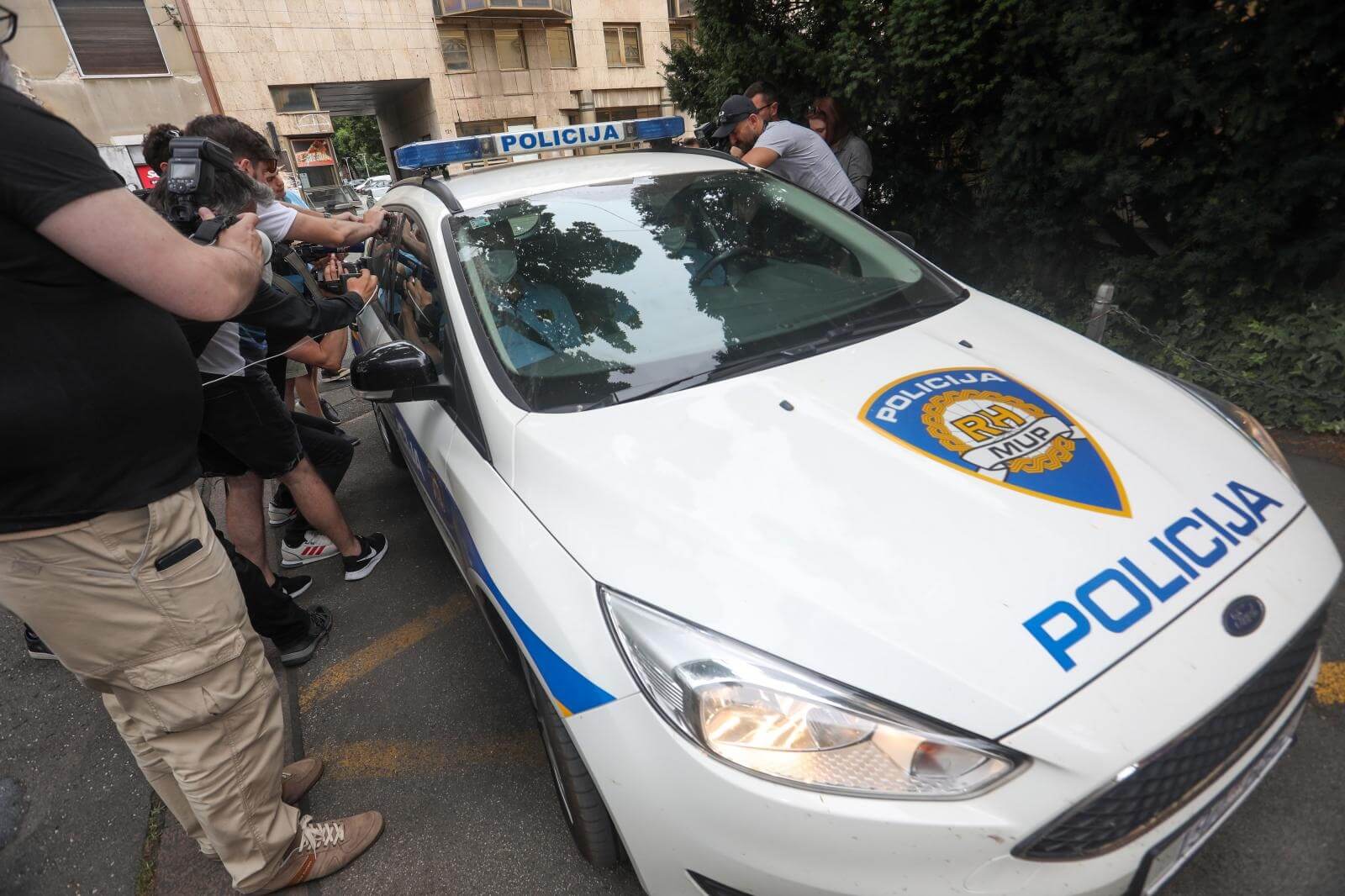
© Marin Tironi / PIXSELL
Highlights of the week: Uskok arresting Zagreb entrepreneurs and associates of former mayor Milan Bandić
The Office of Zagreb Mayor Tomislav Tomašević said on Wednesday that a preliminary investigation by members of the Office of the Chief State Prosecutor and the Office for Suppression of Corruption and Organised Crime (USKOK) started at the city administration offices at 6 am on Wednesday.
As TCN wrote, several people were arrested on suspicion of corruption, including the director-general of the HRT public broadcaster, Kazimir Bačić, Andrea Šulentić, and Ana Stavljenić-Rukavina. Both Šulentić and Rukavina were directors in Zagreb administration offices and close associates of former mayor Milan bandić. At the same time, details Bandić's heavy corruption (suspected and known publicly earlier) came to light.
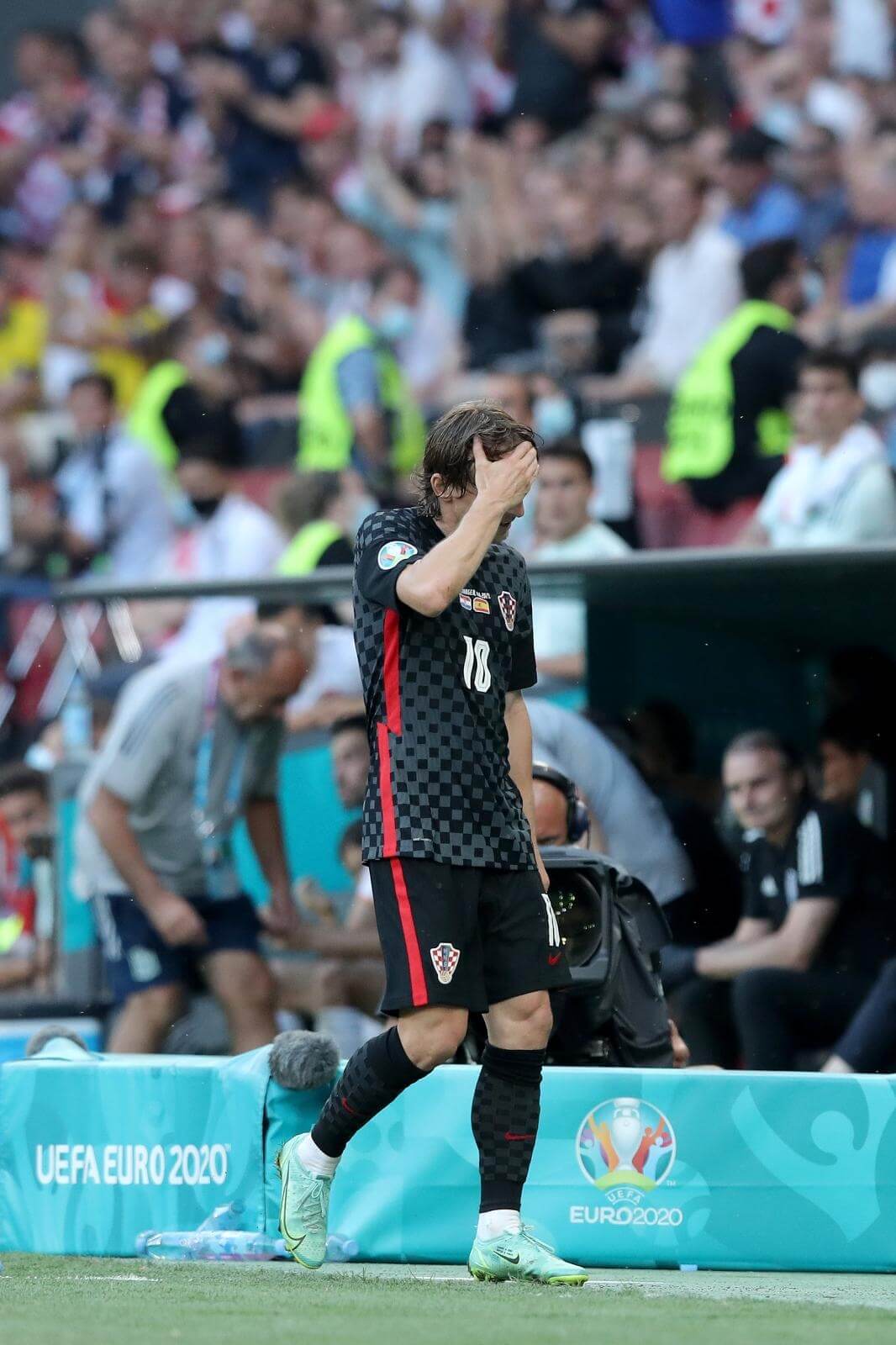
© Goran Stanzl / PIXSELL
Highlights of the week: Croatia eliminated from Euro 2020 after losing to Spain
Croatia and Spain met in Copenhagen on Monday for their EURO 2020 round of 16 match. It was a decent effort from Croatia, but not enough. Despite the Spain own goal in the 20th minute, the distraction as Rebić went to change his boots saw Spain even the score. The score towards the end of regular time went to 3:1 for Spain, but Croatia managed to lower to 3:2 and finally, in the added time, Pašalić scored for 3:3.
But, the euphoria was ruined for Croatia as in extra time, Morata earned Spain 4:3, and by 103rd minute, the total and final score was 5:3 for Spain. It was one of the more intense games on Euro so far as both teams show incredible spirit and persistence.
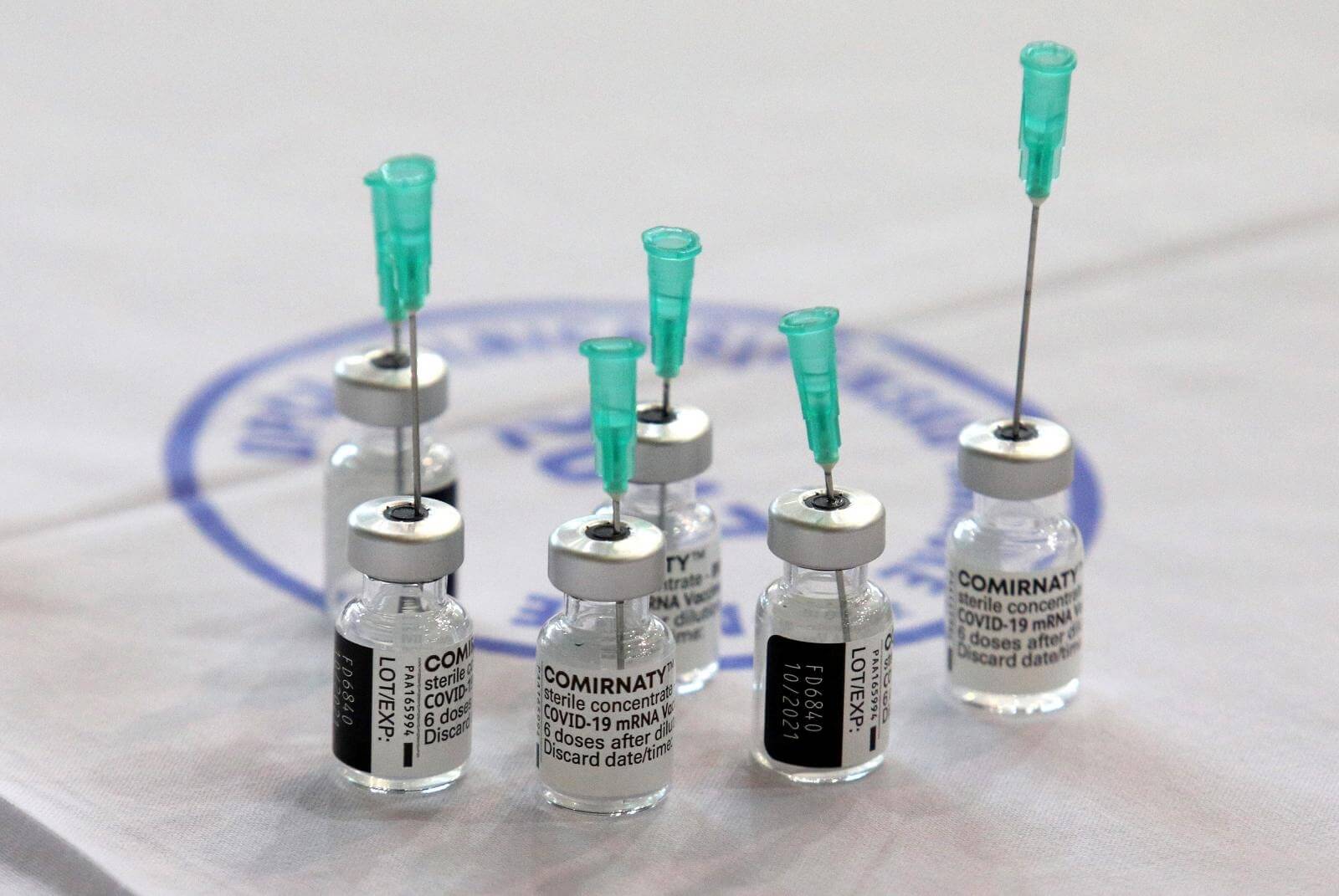
© Dusko Jaramaz / PIXSELL
Highlights of the week: Opposition parties against vaccination being required for job-keeping payments
The Social Democratic Party (SDP) called on Prime Minister Andrej Plenković on Thursday not to make vaccination a requirement for job-keeping payments, while the Most party said business owners were being blackmailed into vaccination.
As TCN reported, SDP leader Peđa Grbin elaborated his dissatisfaction via social networks.
"In Croatia, mandatory vaccination is possible, but the obligation is first established under the law on the protection of the population and then regulated and worked out under Immunisation Rules and the Mandatory Vaccination Programme. The obligation of vaccination can't be imposed in another way, notably not by linking support for entrepreneurs with vaccination," SDP president Grbin posted on Facebook.
"Most is against entrepreneurs, who are being forced into vaccination through blackmail, saving the government's mindless epidemic policy", stated the Most party on its official Twitter account. They added that Croatia was stuck with over 300,000 surplus vaccines because of poor government moves and communication omissions.
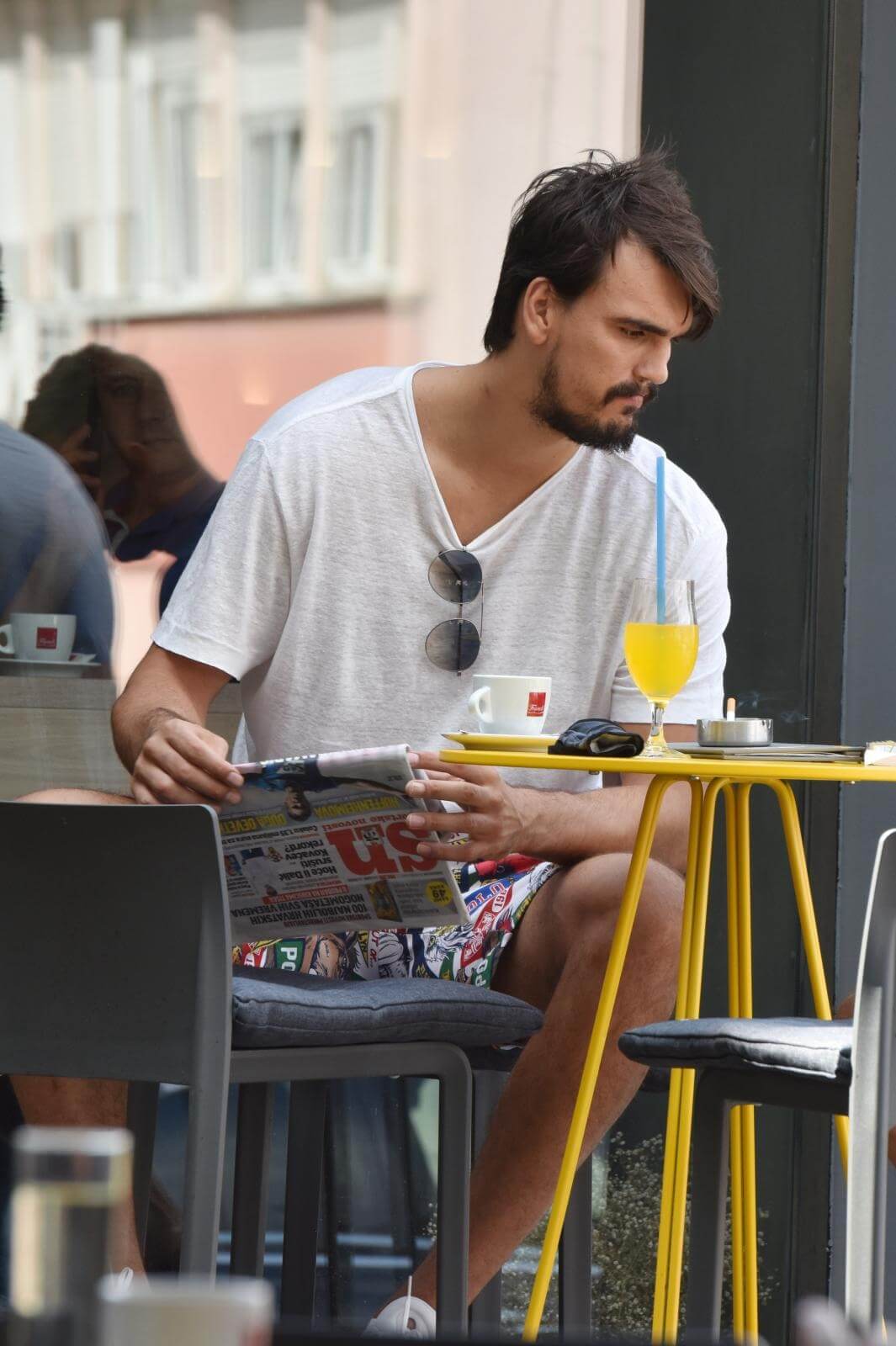
© Hrvoje Jelavic / PIXSELL
Highlights of the week: Dario Šarić becomes 5th Croatian basketballer in the NBA finals
Šibenik's Dario Šarić is the 5th Croatian basketball player to reach the NBA finals! As TCN wrote, Šarić became only the fifth Croatian basketball player in the NBA league finals, joining the company of Dražen Petrović, Toni Kukoč, Žan Tabak, and Ante Žižić. Šarić plays for Phoenix Suns. They topped the Los Angeles Clippers 4-2 in the NBA Western Conference Finals. Apart from basketball, Šarić also likes to enjoy sipping coffee on Šibenik cafe terraces, as portrayed in the photo.
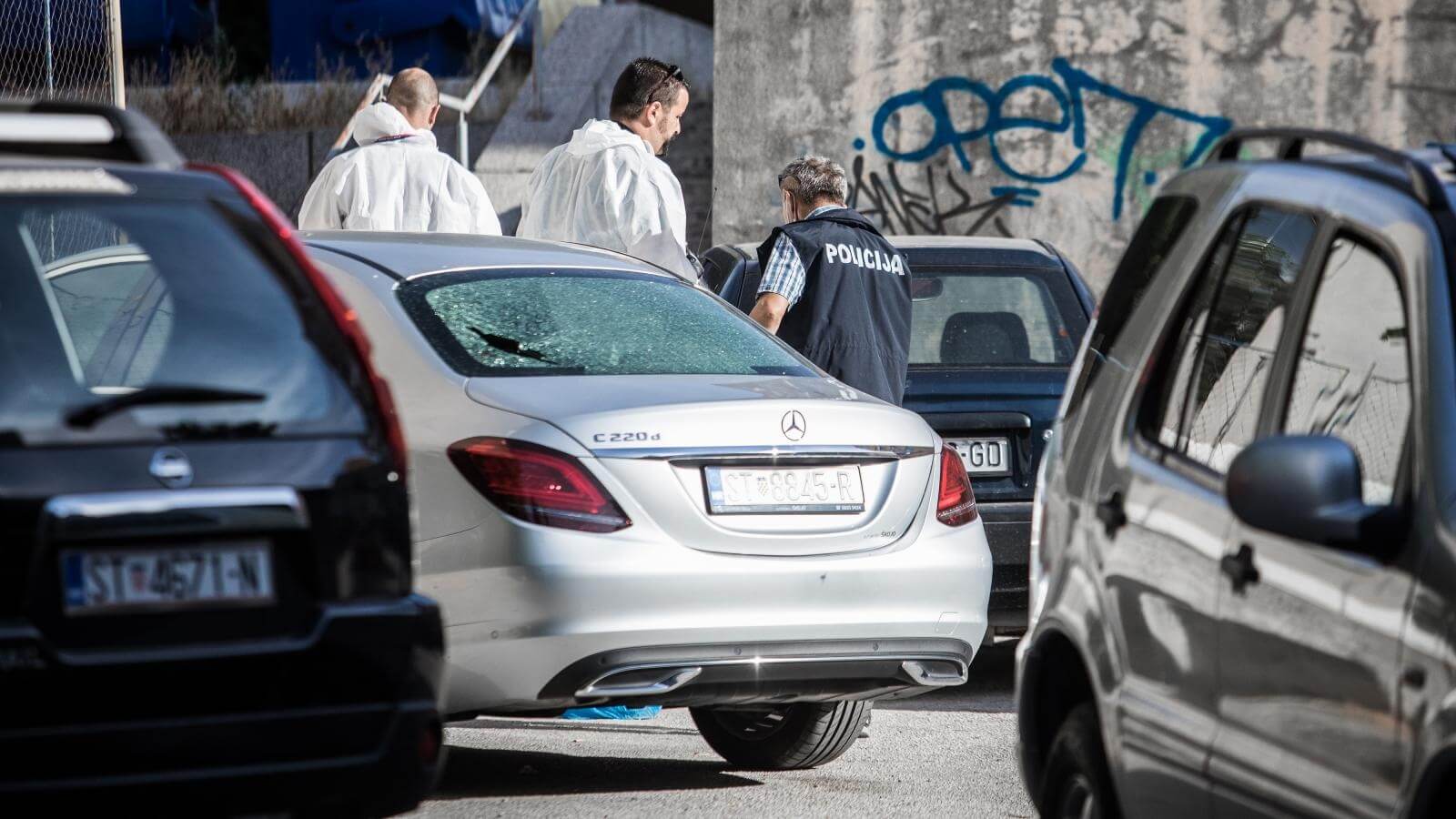
© Milan Sabic / PIXSELL
Highlights of the week: Bomb planted in Split. One person injured
In the night from Thursday to Friday, an unknown person placed an explosive device underneath a vehicle. The explosion damaged six cars, and one person required medical attention. The investigation is ongoing since Friday morning.
To learn more about Croatia, have a look at our TC website.
For more about news in Croatia, follow TCN's dedicated page.
Eight Businessmen, Two City Employees Arrested in Zagreb
ZAGREB, 1 July 2021 - The USKOK anti-corruption office and police continued an anti-corruption operation in Zagreb on Thursday arresting, according to unofficial information, eight businessmen and two city employees.
According to unofficial information, the city employees received money from the businessmen who wanted to land jobs from the city.
The media reported that one of those arrested was Zdranko Čabraja, a member of late mayor Milan Bandić's Labour and Solidarity Party's city committee.
A number of persons connected with Bandić were arrested yesterday, including the HRT public broadcaster's director, Kazimir Bačić, allegedly suspected of influence-peddling in exchange for a flat he was given as a bribe by businessman Milan Lončarić, also arrested on Wednesday.
Media reported that Bačić allegedly mediated between Lončarić and Bandić for the legalization of the Gardens of Light projects and that he personally brought money to Bandić in his office.
Zagreb Mayor Tomislav Tomašević yesterday confirmed the arrest of two city employees, the head of the mayor's staff service, Andreja Šulentić, and former Bandić chauffeur Zdravko Krajina.
Among those arrested yesterday are another Bandić chauffer, Vladimir Žaja, a former head of the Commission for the lease of public areas, Jelena Čeklić, the head of the mayor's staff service, Andreja Šulentić, Denis Mohenski, also known as the King of Advent, and Ana Stavljenić Rukavina, a former associate of Bandić's.
The police and USKOK are expected to say more about the arrests during the day.
For more news in Croatia, click here.
Best Zagreb Mayor By Historians: Historians Shouldn't Rate, But Većeslav Holjevac Takes Lead
May 11, 2021 - Ahead of the local elections, following the death of Milan Bandić and troubling issues Zagreb is facing at the moment, TCN reporter Ivor Kruljac wondered who is the best Zagreb mayor by historians.
With the local elections happening in Croatia this Sunday, just as every year, 2021 is no exception, with all eyes directed on Zagreb. This is no surprise, given that, for better or worse, Zagreb is the capital city, the center of politics, culture, science, education, and the spot where Croatians from other smaller towns, villages, etc. come in search of a job and new opportunities. You may not necessarily need to leave the country to leave your dreams, and despite other regions of Croatia slowly but surely developing, Zagreb is still considered by many as the necessary place to go to achieve something.
And this year, the eyes are even watching in even bigger suspense; Milan Bandić, who was the first man of the city for 20 years, passed away in February. The ever-controversial political figure (now replaced by his deputy Jelena Pavičić Vukićević, who also runs in the elections) suspected of corruption, being arrested during his mandate and on several trials, left lots of unresolved issues which the new mayor will have to address in the city's administration. Additionally, the current corona crisis caused some new challenges, and last year's earthquakes and city reconstructions are still a hot political topic among citizens.
Zagreb: History of overcoming the crisis
Challenging circumstances in 2021, no doubt, but certainly nothing Zagreb isn't used to. While settlements on the city's territory date earlier, the first mentions of Zagreb are linked with establishing of Capitol Diocese in 1094. Since then, diseases, earthquakes, floods various wars (WW1 and WW11 included, as well as the 90s war Croatians commonly refer to as the Homeland War), disrupt the peaceful life of Zagreb citizens. The city still stands. But of course, these different troubling contexts were handled not just by citizen's persistence but also by the city's authorities and leaders.
Throughout the turbulent history, Zagreb had, concluding with current deputy Jelena Pavičić Vukičević, a total of 53 mayors. The first one was as, Povijest.hr writes, Janko Kamauf, whose term lasted six years, from May 15, 1851, to 1857. He was a former city judge of Gradec, a title whose authorities basically made him the mayor of Gradec. Following the unification of rival Gradec and Kaptol into one city in 1850, he was elected to be the first leader of a city whose population at the time counted 16,036 people.
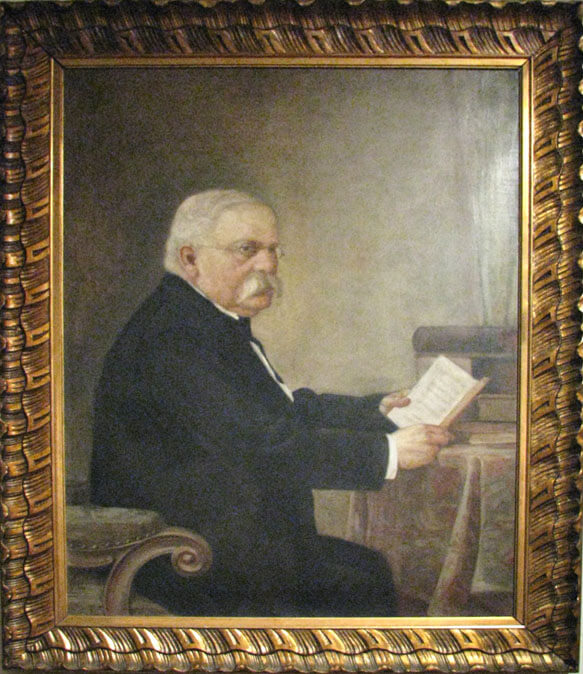
Janko Kamauf painted by Bela Čikoš Sesija, showcased in Zagreb City Museum © Unkown author, Wikipedia
He was the first, but was he the best?
I asked several historians if could they rate and pronounce in their opinion, with regards to the specific contexts, who was the best Zagreb mayor, from Kamauf to Vukičević Pavičić.
Two votes for Većeslav Holjevac!
„I'm not into grading, that's not a historian's task. Our task is to explain and put on the table facts and context of events“, said Ivo Goldstein when I asked him about the best mayor of Zagreb.
Ivo Goldstein may be best known to the Croatian public as a harsh critic of the far-right and the fascist regime of the Independent State of Croatia. As a Historian, he took an interest in various topics related to Croatian history.
At the start of his career, his focus was on Byzantine Empire and Croatian Middle Age History as well as the history of Jews in Croatia. In mid 90's he moved to the various aspects of Croatian history in the 20th century.
He was a professor of various history courses „General History of the Middle Age“ (1984-2003), history of methodology (1991-1996), and many more and today a full-time professor at the Department of History on The Faculty of Humanities and Social Sciences, the University of Zagreb (where he mastered and later completed his Ph.D. thesis at the Faculty of Humanities and Social Sciences, University of Belgrade).
Goldstein's scientific papers received positive acclaim in various countries worldwide, he hosted various projects scientific projects and associations and is very active in Croatian public space when it comes to historical issues that shape the ideas and decisions of current policies in Croatia.
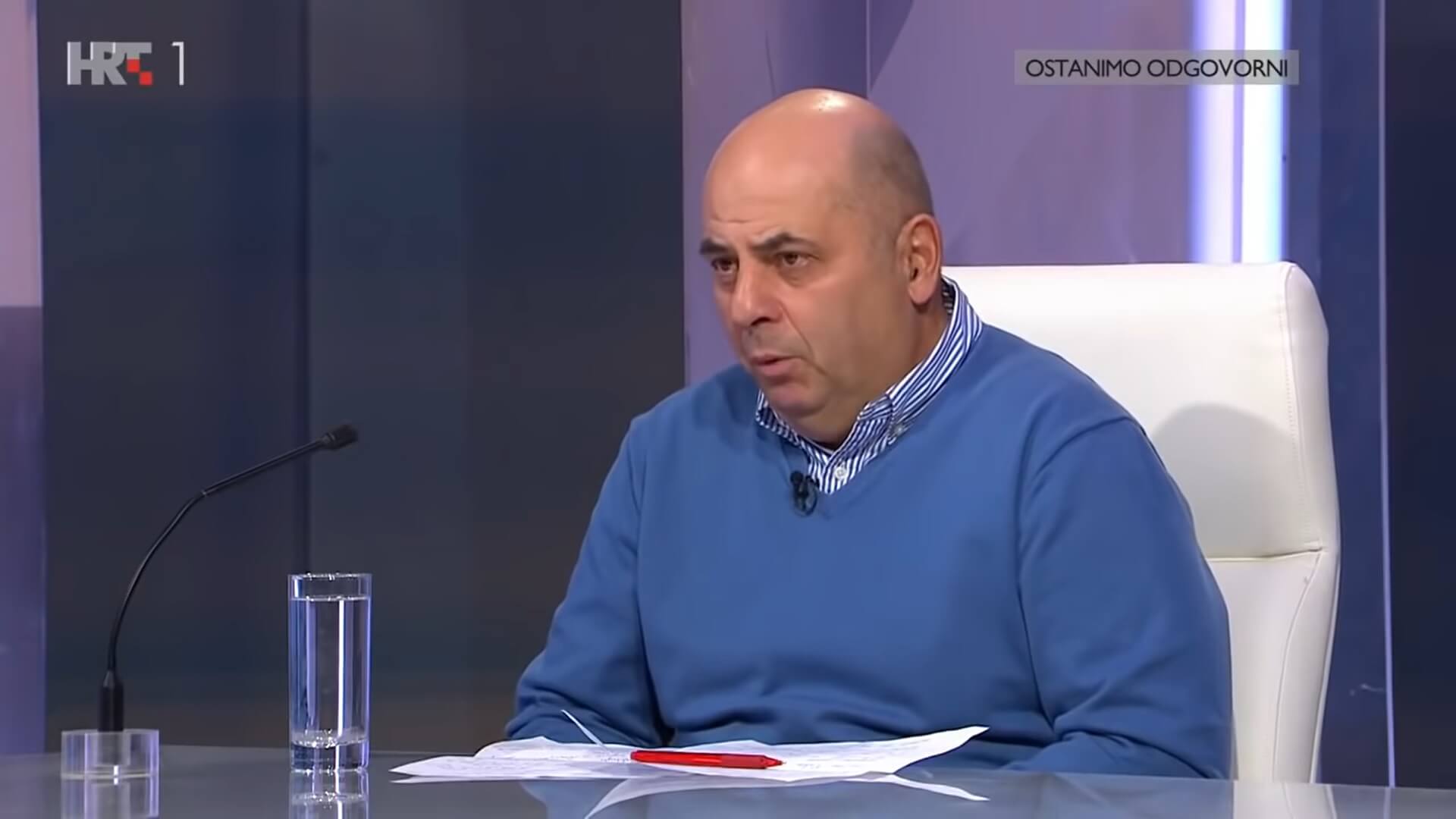 Ivo Goldstein / screenshot HRT Nedjeljom u 2
Ivo Goldstein / screenshot HRT Nedjeljom u 2
Upon explaining the role of historians, professor Goldstein nevertheless didn't mind giving his personal opinion.
„For me, there is no doubt that the best mayor of Zagreb is Većeslav Holjevac“, said Goldstein.
Većeslav Holjevac was the Mayor of Zagreb from 1952-1963 and his eleven-year mandate saw Zagreb develop and spread as the city.
„At that time, Zagreb was the capital city of Socialist Republic of Croatia, which was part of Yugoslavia. Holjevac saw a boost by liberal politics, it was the time of growth and optimism and Holjevac knew how to use it. He was a man of action and used Yugoslavia's opening to the world to Zagreb's benefit“, explained Goldstein.
He added that Holjevac didn't want to be perceived as some sort of transmission of higher state authorities. He didn't hide behind forums and was an independent, free-minded politician, which made him known and beloved among citizens.
„But it made him unloved among the higher power of authority which ended his mandate, although we historically don't know the real reason why Holjevac stopped being mayor“, Goldstein pointed out the mystery which is yet to be cleared up by historians.
The key term of Holjevac's mandate is the General Urban Plan which saw the development of the Most Slobode (Bridge of Freedom), expansion of Zagreb city to south across Sava river, and what today is Novi Zagreb (New Zagreb), as well as building up Zagreb Airport.
„Holjevac knew how to surround himself with good associates who were both dreamers and experts. Holjevac also engaged himself in the projects and his associates felt safe and that he got their back“, explained Goldstein.
The best example of that boldness and visionary approach can be seen in the Zagreb fair which was at that time located at the place of today's Student Centre in Savska.
„The fair needed expansion but was surrounded by railroad tracks everywhere, and the question was how to expand it. There were several options, but Holjevac decided to take it across the Sava river, and it happened. It was quickly constructed, and the first fair on newly build location was the Autumn fair in 1956. and it was the biggest event of its kind in the world back then“, said Goldstein, gladly adding he even had a chance to meet Holjevac as a 12-year-old since the mayor knew his father, an established Croatian intellectual, and politician, Slavko Goldstein.
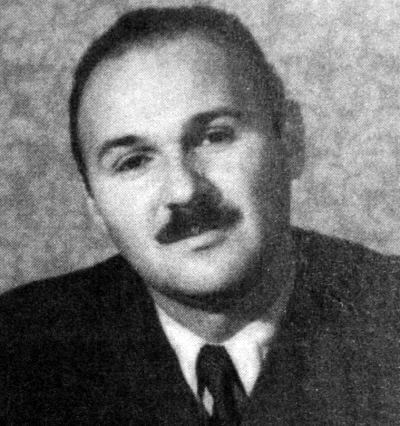
Većeslav Holjevac © Udruga Kameleon / Wikipedia
Hrvoje Klasić was professionally most occupied by Većeslav Holjevac, so he also shares Goldstein's opinion about Većeslav Holjevac.
„In a sentence: Zagreb has never been more developed as it was after Holjevac“, summarized Klasić.
Hrvoje Klasić graduated in 1997 from the Department of History, Faculty of Humanities and Social Sciences at the University of Zagreb. At the same University, he defended his dissertation entitled “1968 in Yugoslavia. Socio-economic changes in an international context”. Since 2003 he has been employed as a professor at the same Faculty and University.
Today, he holds a number of courses related to the world and national history of the 20th century.
Hrvoje Klasić also won the Annual Award of the Association of University Teachers and other Scholars in Zagreb in 2006. That same year he won the Annual Award of Sisak City for the Book „Croatian Spring in Sisak”. He is the author of 3 more books and the author of two documentary series „Croatian Spring“, and “The Independent State of Croatia” produced by Croatian Television. In 2017 The Serb National Council in Croatia gave him an award for the improvement of Croatian-Serbian relations. In 2019 he won the Award for the promotion of peacebuilding, nonviolence, and human rights.
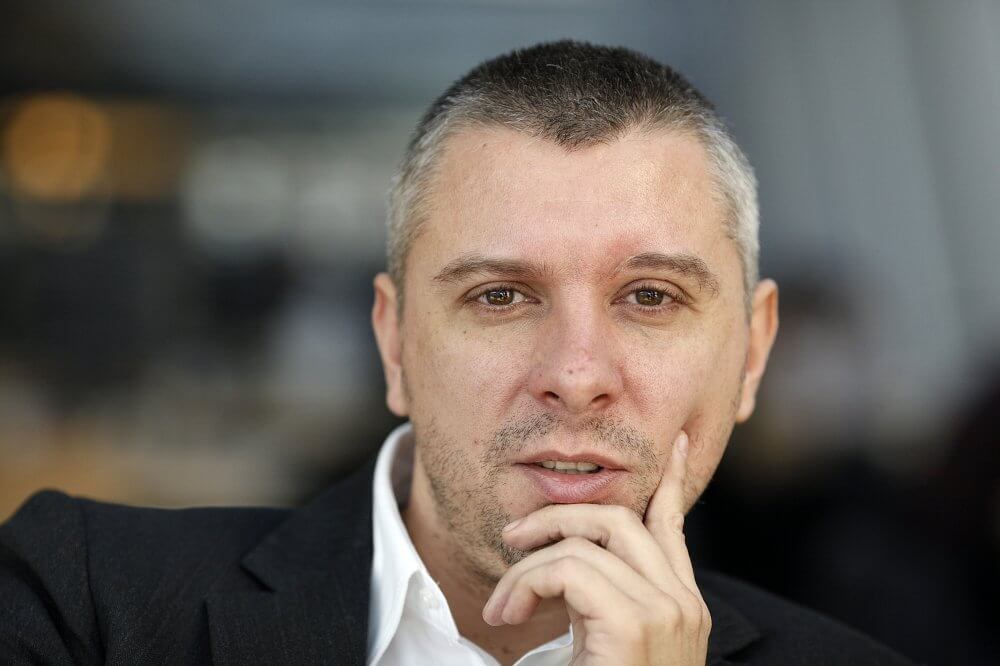
Hrvoje klasić © Hrvoje Klasić
„Most people don't know that Holjevac technically wasn't a mayor, rather he was a president of the City's National Council“, explained Klasić the precision of the functions in the previous Yugoslavian state. He added that while his term lasted from 1952-1963, that is only partially true because he was first appointed to lead Zagreb in 1945.
„In 1945, he was named the city commander who was a military function but he was also in charge of food, traffic, working with several refugees after World War 2 until he gave the control over to civilian bodies“, describes Klasić.
Holjevac then moved on to be the minister of work and traffic in the Social Federal Republic of Croatia. However, at that time, Yugoslavia was going under a change in its political institutions by the self-governing policy which went under parole „factories to workers, cities to citizens“, and as a result, Holjevac 's ministry was shut down. His return to the top position in Zagreb happened without him even knowing.
„As part of self-governing, the Communist Party in Zagreb searched for someone who isn't just going to execute orders from above but instead is an individual that has quality, creativity and will make its own decisions. Holjevac was elected during a meeting he wasn't even present on, and some members of the party were worried is it smart to give Zagreb to a person who is from Karlovac“, said Klasić.
As Goldstein already mentioned, his term lasted over a decade, and Klasić adds that was a very unusual duration at the time.
While Goldstein already mentioned the traffic connections of Zagreb, Klasić said it is very hard to count everything Holjevac built, but he put focus on the industry. Industrial plants of organic-chemical industry, Zagreb heating plant, industrial plants of Pliva pharmaceuticals, Chromos paint company, Kemika, Zvijezda company, Katran, Badel company for alcohol spirits, an ice rink on Šalata, winter pool and gymnastics gyms on Mladost, Yugoton record company, Jadran Film, TV tower on Sljeme, Zagreb drama theatre, an emergency room in Draškovićeva, various elementary and high-schools, and began construction of Vatroslav Lisinski concert hall and more.
„Before Holjevac, there were 40,000 workers in Zagreb. After Holjevac, there was 110,000“, said Klasnić to illustrate the results which made the city the strongest industrial center in Yugoslavia. Apart from industry, Holjevac put a lot of focus on culture and education, as evident by building Workers University Moša Pijade for adult education (today's Public Open University Zagreb) and culture.
Holjevac's „Jump over Sava“ was done on the one hand to prevent interventions in old Zagreb, and on the other, the organizational construction of Novi (New) Zagreb saw the workers live close to the newly built factories.
As Goldstein already referred to Zagreb Fair as perhaps the most significant project of Holjevac's mandate, Klasić added that the unique geopolitical position of Yugoslavia as the bridge between east and west, thanks to the non-aligned movement, made the fair a key place worldwide.
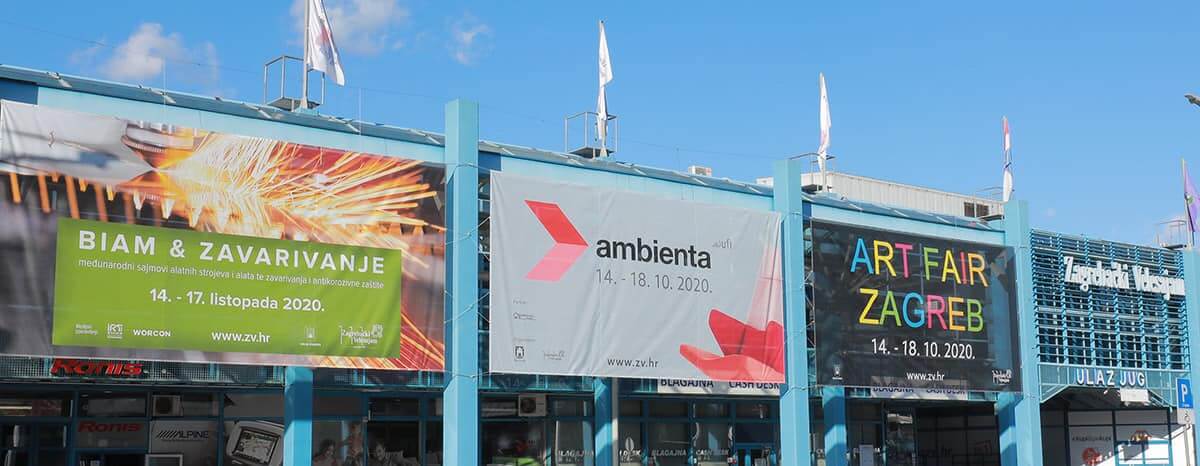
Southern entrance of Zagreb Fair in 2020 © Zagrebački Velesajam
„The fair was not just important for holding exhibitions, but for making deals and signing contracts as well. Given Belgrade was the capital of Yugoslavia, there were pressures to have such a fair there, and there were even boycotts from Belgrade to Zagreba Fair events. However, Holejvac being both persistent and enjoying support by the Yugoslavian president Marshall Josip Broz Tito, managed to keep this significant place in Zagreb“, explained Klasić.
When asked about resentment of other politicians, and the unclear mystery of concluding his mandate, Klasić said he had a chance to look at archives about Holjevac while working on an exhibition about him, and he feels that the situation is much simpler.
„Holjevac basically left due to the same politics that got him to be the mayor in the first place. The Self-Governing model started descending to the lower levels of the system and started searching for creative people. In 1963, a new constitution was brought that further developed the political system to give City Assembly more power accenting the community governing Zagreb. Holjevac's president of City's National Council title has shut down, and the president of Assembly became the first man of Zagreb.
Rotation of politicians as well as limited mandate time was arranged too“, explained Klasić.
He added, however, that it is problematic that an experienced, capable, brave, and brilliant man like Holjevac wasn't put to better use after he stopped being mayor and played bigger roles in Yugoslavian political life.
There isn't the best, only good and bad mayors
Unfortunately, other historians, I contacted (and of course, I couldn't contact every single one, who knows who else might be interested to participate), didn't respond to my inquiry. While Ivo Goldstein explained rating mayors isn't historian's job, Stevo Đurašković, professor at the Faculty of Political Sciences in Zagreb, further elaborated the problem of my question.
„I'm not a fan of such an approach to the topic like it's a miss pageant. In Zagreb's history (as in good portions of cities around the world). There were several great mayors, again, each in its own historical context“, explained Đurašković.
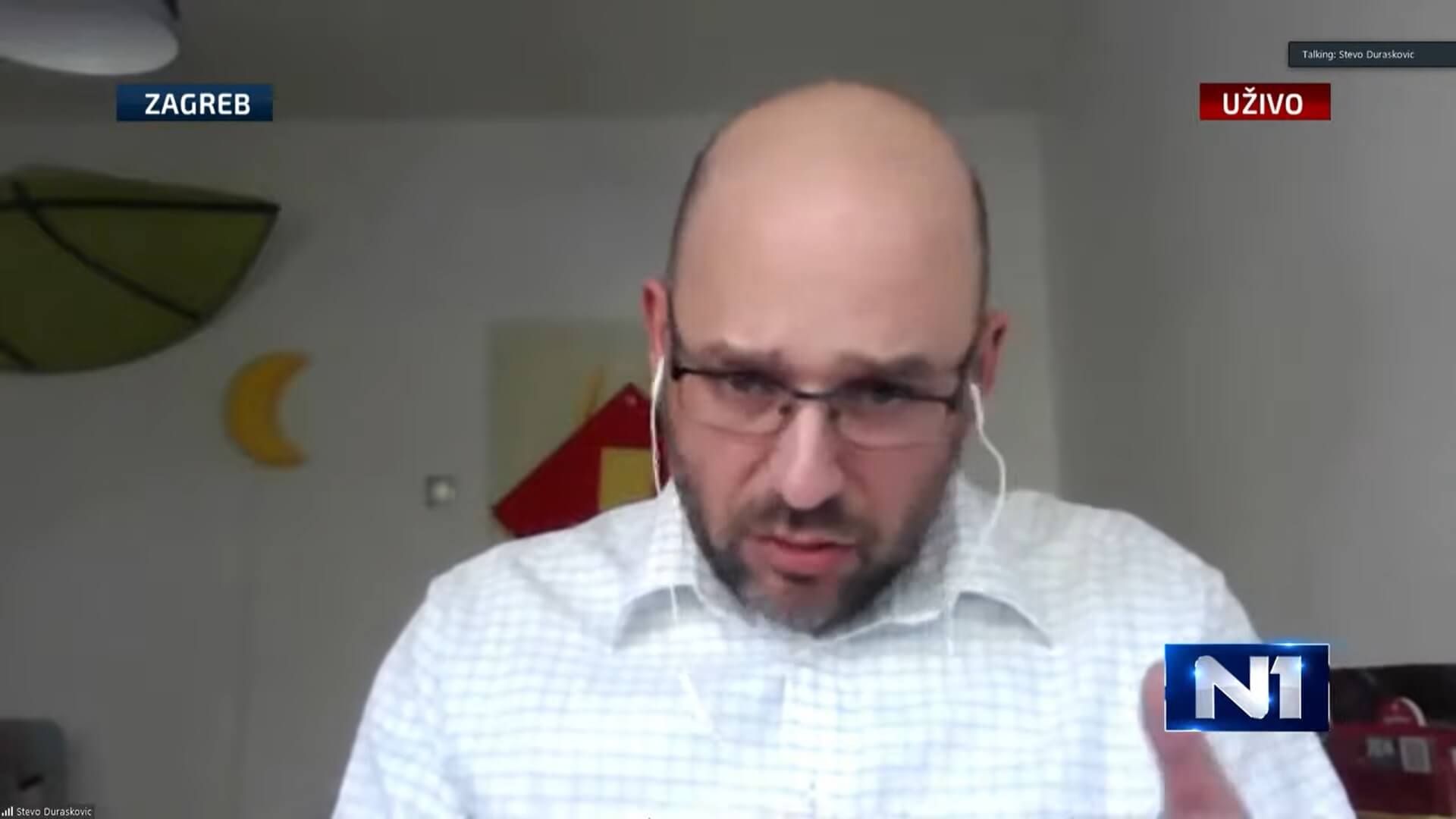
Stevo Đurašković, screenshot / N1
Stevo Đurašković is an Assistant professor at the Faculty of Political Sciences, University of Zagreb, where he teaches courses in politics of history and Croatian history. He received his Ph.D. in Political Science from the Faculty of Social Sciences at the University of Ljubljana and his MA in Central European History from the History Department at the Central European University, Budapest. His research interests include the politics of history, intellectual history, and national identity-building processes in East-Central and Southeastern Europe. Recently he published the book The Politics of History in Croatia and Slovakia in the 1990s (2016). Participated in several international projects, including “Identity Reader: Regional Identity Discourses in Central and Southeast Europe, 1775-1945” (CAS, Sofia). He is a member of the editorial board of the Cultures of History Forum (Imre Kertész Kolleg, University of Jena). In 2009/2010. He was a Ph.D. research fellow at the Faculty of Economic and Social Sciences, Comenius University, Bratislava (CEEPUS grant, Visegrad Fund grant).
In other words, an expert in his respective field with a valid and knowledgeable opinion.
„Milan Amruš and Većeslav Holjevac were great mayors. How to determine if Amruš's development of pre-war Zagreb is greater than Holjevac's post-war development of Zagreb?“ concluded Đurašković his decline to comment who would be the best mayor of Zagreb.
Speaking of Amruš, he was Zagreb mayor in two separate mandates, the first one lasting from 1890 to 1892 and the second from 1904 to 1910. Lice Grada reports that some of the accomplishments in Maruš terms include electrification of the city, and building up Munjara Power Plant (in 1906 and 1907). Under Amruš's mandate, the website continues, horse trams were replaced by electric trams in 1909 and new tram lines and the expansion of the previous one from Ilica to Topnička Barracks were constructed. In addition, 1890 saw lower and upper Zagreb connected by a funicular.
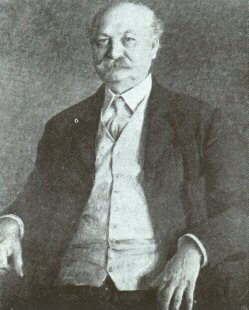
Milan Amruš © Unknown author Wikipedia
Đurašković also added in his decline that Pero Pirker is often „a forgotten mayor“, and Klasić mentioned him as the Holjevac's successor. Mentions of Pirker are also noted on Nacionalne Manjine (National Minorities) site that declared Pirker as a noted Zagreb mayor.
"There is no doubt that Pirker is one of the most capable, most successful, and in its time an extremely popular mayor. But it is stunning that for political reason, considering he was one of the established champions of Croatian Spring in 1972, his work was completely silenced not only until the 1990s but also later“, wrote Goran Beus Richembergh for Nacionalne Manjine.
It's worth noting that the Croatian Spring was a reawakening of national identity which paved the way for the country's independence and the dissolution of Yugoslavia, on which TCN reported on its 50th anniversary earlier this year.
In Pirker's time, the Great flood that sank Zagreb in 1964 was truly the historical challenge of his mandate.
„It was a natural disaster of great extent, and the entire previous state (Yugoslavia) was involved in sanitation and help was arriving from all over the world. But, the biggest responsibility for the coordination of help, sanitation of the damage, taking care of the casualties, and building new homes was carried out by Zagreb's authorities, lead by Pirker who showed to be a skillful manager and successful in various projects“, described Beus Richembergh.
Amruš had the challenge to electrify Zagreb to keep up with other European capitals, Holjevac had the challenge of restoring and developing the city post WW2, and Pirker had the flood.
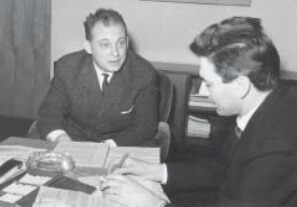
Pero Pirker (on the left) © Croatian Journalist Association / Wikipedia
Both corona and earthquake, as well as the mess suspected to find post-Bandić, are all just another challenge in the history of a town that is used to be challenged and always dancing victory laps.
While Đurašković explained comparisons of what was the most difficult challenge and who was the best mayor make no sense, Goldstein and Klasnić presented their pick. But, as respectable historians they are, they emphasized that it is their opinion and not an empirical fact, even though their arguments are both knowledgable and well explained.
In the end, politics should be about making people's lives better and not about chasing crowns or historical acknowledgments. And as Zagreb really needs a quality leader, the only logical conclusion is: may the best candidate wins, and may purgers recognize the best man or women for Zagreb to once again wave the middle finger to the aftermaths of the recent crisis as it overcomes them.
Learn more about Zagreb on our TC page.
For more about history in Croatia, follow TCN's dedicated page.
VIDEO: Zagreb Earthquake 2020, One Year Later
March 22, 2021- On the Zagreb Earthquake 2020 first anniversary, TCN reporters Ivor Kruljac and Jose Alfonso Kusijanović took to Zagreb's streets to see how locals feel one year later.
6:24 AM March 22, 2020. It was Sunday, but sleep was as light as it was a workday full of obligations. Zagreb's citizens were awakened by a horrible sound followed by walls shaking, the ground trembling and things falling all over the place. Amid the coronavirus pandemic, at the very end of the first week of the first lockdown where it was advised to stay indoors to prevent the spread of the virus, there was no choice but to rush out of the house, discombobulated and without a clue of what exactly is the damage that 5.5 magnitude earthquake did. Individuals, couples, and entire families were outside but at a distance from one another, and just after the first aftershock, it started to snow. If you didn't leave the very center of Zagreb, the first sign of damage was the cathedral, whose top of the left tower collapsed, and only later you started to see the images of the center, which many compared online to Beirut. The Covid-19 National Response Team expressed its condolences on TV but warning everyone to keep the distance due to corona. Emergency services rushed to the city, later followed by the army. People who lost their homes were taken to student dorms and other locations with free space in the following days. Sadly, a 15-year-old-girl was fatally injured during the earthquake and passed away at Klaićeva's Children Hospital.
One year later, citizens of Zagreb still have mixed feelings about the event. Here are their answers in our short interview.
Shaking the memory
Senior citizen Ljerka was walking around European Square. Her home survived the quake, and the aftermath was books that fell from a shelf and broken bottles and jars in her pantry. She learned about that damage after a few days when she returned home from her sister's because she was too scared to be alone. The memory of last year still gives her the chills. „I jumped out of bed and lost my head; you have no idea where to go. You don't know what to do. I quickly grabbed something, half-dressed, rushed to the street. People were standing outside confused who didn't know where to go or what to do, nothing“, she said. Describing herself as an optimistic person, the scary experience is still stuck with her even one year later. „You remember it from time to time, but you can't forget it," said Ljerka.
A young guy named Dejan Jakovljević was casually walking around a crowded Dolac market, carefully with a mask to respect the measures in the crowds. He handled the earthquake pretty well as he lives in a new building with lots of concrete and reinforcement.
„It woke me up, but I knew it was an earthquake. It didn't scare me. I just waited for it to be over“, said Dejan. Responding to how he feels about it one year later, he briefly acknowledged that he „honestly forgot about it. “
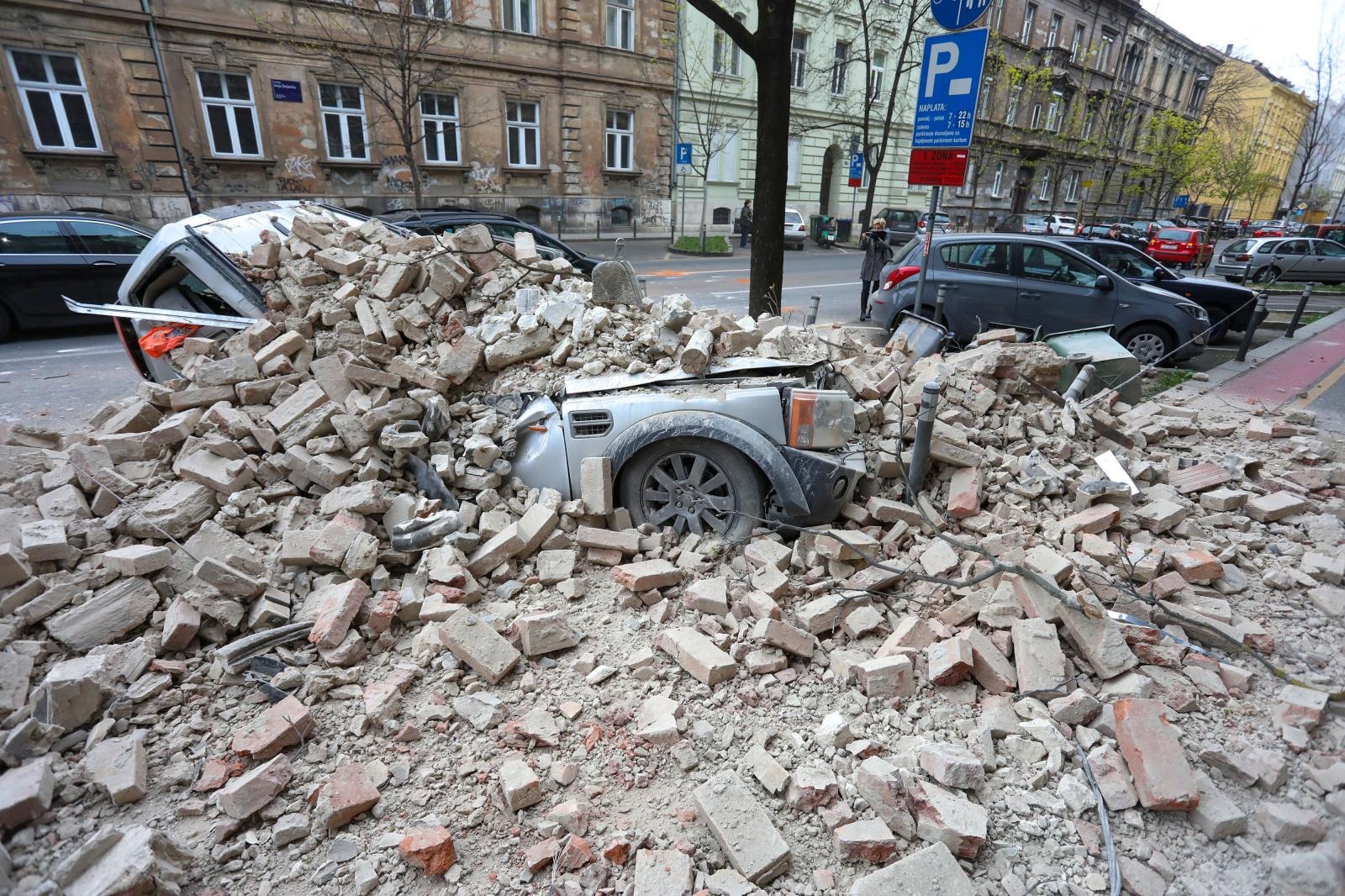
Borna Filic / PIXSELL
The same can't be said for American-born Stefanie Mikac from New York. We met her while she was walking her dog in Zrinjevac park. Her home was badly damaged. „I was in the bathroom dancing left and right. I didn't think it was an earthquake, I thought 'what is it, the devil had come!’ and there was smoke“, remembered Stefanie. When she realized it was an earthquake, she hid under the door, and when it passed, she searched for her dog that hid in the apartment before finally escaping her flat. On her trip to Hawaii, where earthquakes are quite frequent, she accepted that there is not much you can do against mother nature. Despite her bad experience, a year later, she feels safe in Zagreb. „Very secure, safe. You know, you have to take things as they come, “ said Stephanie sharing her positive attitude.
We spotted Mira Francem walking on Jelačić square. Her house was built following all the construction demands and proved to be earthquake-proof. Still, the rocky feeling isn't something that she liked. „I personally felt terrible. I had a feeling the whole world was collapsing, and in the end, that feeling of losing the ground under my feet is an instinct, you know?”, said Mira adding that even though her house is fine, the trembling ground was awful. When asked if there is still anxiety over the last year's event, she resoundingly repeated, “yes.”
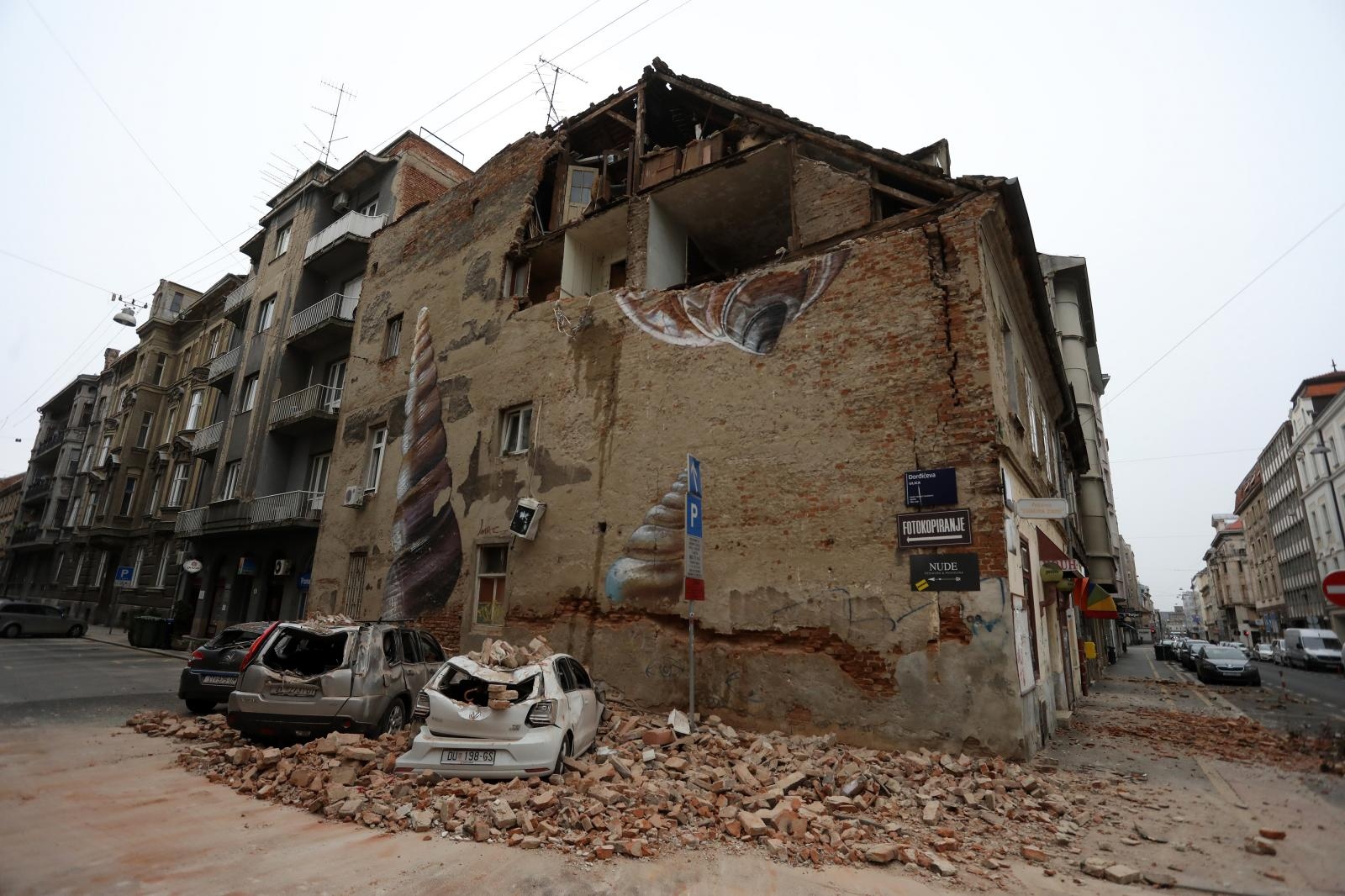
Borna Filic / PIXSELL
Mladen Habuš was standing on Vlaška street that connects European Square with Kaptol, where the City's cathedral is located.
“My home was okay. The earthquake surprised everyone at first, but fortunately, they don't last, so you stabilize psychologically”, said Mladen calmly, as if it didn’t really leave an impression on him.
“I already forgot about it because it's not as frequent as in Glina or Petrinja, whereas they say, it shakes every five minutes,” he emphasized, and that the key is to remain relaxed.
December – another round, another rumble
The second earthquake with a 6.4 magnitude that hit Petrinja and ravaged Banovina / Banija didn't damage Zagreb as it did to the southern part of central Croatia. Still, it was certainly felt, and many agreed it was stronger than the one in March.
„Jesus Christ! That one was even worse!“said Ljerka the second I mentioned the Petrinja earthquake. She learned that Zagreb is situated in a seismic active area, and earthquakes are something people in Zagreb need to learn to live with, but March didn't make her welcome the December tremble with more ease. She ran out of the house, not knowing what when her niece, who also lives in Zagreb, called her.
„I asked her if there was another earthquake in Zagreb. I didn't get anything. She said, 'no, that's the aftermath of Petrinja.' We are really close to Petrinja“, said Ljerka.

Nikola Cutuk / PIXSELL
Stephanie was walking her dog during the Petrinja earthquake. She witnessed bricks falling and was relieved nobody was passing underneath at the time. However, when she returned home, she entered the mess, and the damages that were still not fixed from March intensified. „All the cracks are wider now, and everything will need to be taken down to get to the healthy wall,” said Stephanie.
When asked if the December quake was easier or the same to handle for her, she laughed, acknowledging that it was actually worse. “We repeated the reactions from the first earthquake, you know? It's a very unpleasant feeling even today when a tram passes or something buzzes. I think something is trembling, and we are quite tense”, shared Mira. She said that no matter how rational you are, consequences as emotions are different from rationale. “I'm really sorry for those people. My house isn't damaged, but I was scared and lost, and I can only imagine how those people felt. It's a huge catastrophe on which we cannot influence,” said Mira with empathy.
Dejan felt the December quake was stronger but feeling safe in his building; he wasn't too worried. “I instinctively rushed to save the TV. Everything else was irrelevant”, recalled Dejan with gentle laughter underneath his mask.
Despite Mladen being relaxed after Petrinja, anxiety crept up on him too. “You start listening; someone starts a car, you raise your head to see what's going on. You are expecting another earthquake”, said Mladen. Still, he added that “you get used to it.”
Insurance vs. safe building
As revealed earlier this year, 85% of Croatian households don't have earthquake insurance.
Dejan doesn't know if the building had insurance but given his building proved safe, he didn't seem too concerned with that question.
Mira also didn't have insurance, but her investment in the safe building certainly paid off.
Stephanie's home was badly damaged, but she pays 1200 kuna annually for insurance and says it isn't too expensive in Croatia. However, regarding the walls in her home that need to be fixed, there was a bit of an issue. „The insurance company actually secured only the furniture, but then through a lawyer, we made a deal to cover half of it. Something is better than nothing“, said Stephanie.
Ljerka complemented her landlord and how she manages things. Her building received a green sticker but chimneys needed to be removed. Insurance helped there a lot. „We took down the chimney ourselves, and we got the money back, I think 3000 kuna, “ said Ljerka. The roof was renewed a year or two ago, but the same couldn't be said about the terrace residents have in the back of the building. Insurance didn't want to cover it, and a loan was needed to be taken for the fixture.
City officials to the rescue! Or not?
Both the country and international community, not to mention companies and individuals, rushed to help Zagreb, and the now-deceased mayor Milan Bandić found himself challenged to return Zagreb to its old glory and shine as fast as possible. The situation even called for a Zagreb reconstruction bill on the parliament level as the government took the lead in rebuilding the city. In the meantime, Bandić passed away, and with local elections coming up, the city's repair remains a topic for all the candidates that hope to take the lead chair of city politics in May.
Regarding the response of the city officials, Ljerka isn't happy.
„What did the city do? Nothing. It was all ruins. Look at what Zagreb looks like now after the earthquake. How long has passed, and nothing is done. Nothing. Only the houses that people renovated themselves, but the city gave nothing”, commented Ljerka. She did, however, add that the city doesn’t have money and that she understands that.
Mira shares Ljerka's opinion that the situation is better for those who organized repairs privately. Still, when it comes to the city authority response, she says, „it should have gone faster, better, and more organized. “
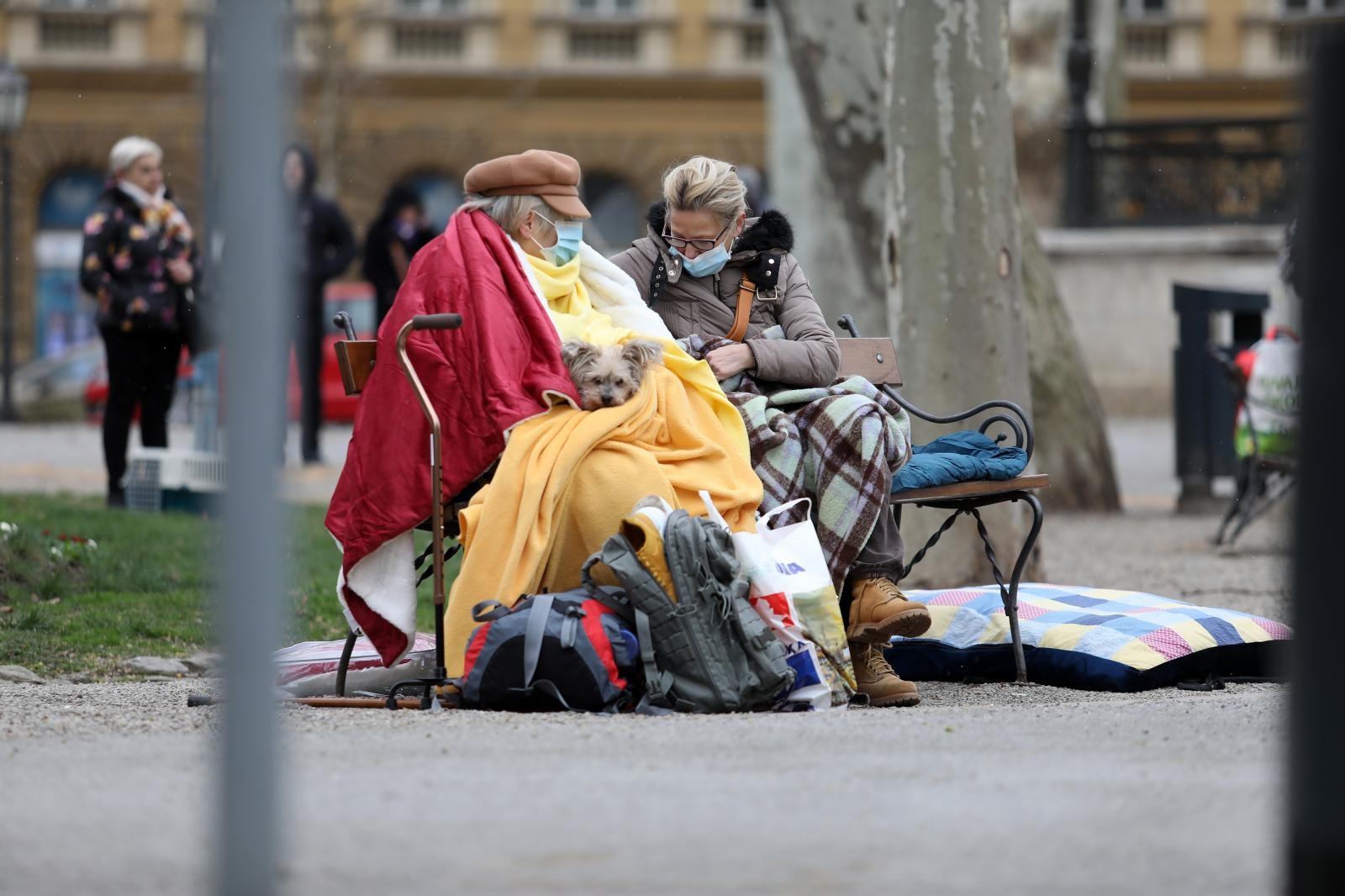
Borna Filic / PIXSELL
„I see a lot of my friends who live in the center. It's all at a standstill. For those who engaged themselves privately, it is better, but otherwise, it is prolonged. It needs to be better, more active, more engaged to ease the people and make them stronger."
Dejan also thinks that the authorities' response was not good and that “they should help people.“
When asked to comment on the city's response to the earthquake damage, Stephanie was hesitant at first. She feared many people would disagree with her opinion and her different way of thinking because she lived in the US.
“Over there, we have asbestos insurance and insurance for everything. If you have a bank loan and the bank has input on the house, you have to have insurance”, explained Stephanie asking me if it is fair for her to pay the insurance while others don’t and later demand the city to pay for everything. “Imagine if the city would fix apartments for everyone and secure the buildings. Nobody would ever do that anywhere. They may give you a percentage, but that's it,” concludes Stephanie.
Mladen is happy with the city's response.
“I think the city, to my knowledge and how much I followed, was the only one that jumped to help those who lost their homes and put them in free spaces,” Mladen pointed out. He also reminds us that the government took over the rebuild and the city is involved with 20%. When asked if it’s good for Zagreb that the government took the lead over the city, a resounding yes was the final answer. “The city doesn't have enough money, so the government needs to jump in," concluded Mladen.
Steady ground wishes above all
Being the biggest and the capital city of Croatia, which attracts people from everywhere in the country and beyond, Zagreb streets offered truly diverse answers to Jose and me. There was more or less fright on March 22, 2020, and different levels of anxiety today. Different views on insurance and the city’s response. We can only guess how differently they will vote in May. But one wish is the constant for the Purger's hearth - the wish to see Zagreb as a safe city where you only get awakened by an alarm clock.
For more about the earthquake in Zagreb, follow TCN's dedicated page.
Interior Minister Božinović: More People Attended Bandić Funeral Than Restrictions Allow
ZAGREB, 5 March, 2021 - Many more people than allowed under COVID measures gathered at Zagreb mayor Milan Bandić's funeral and it is up to civil protection inspectors to establish the circumstances and take action, the head of the national COVID response team said on Friday.
Speaking at a press conference, Interior Minister Davor Božinović said the organisation of Wednesday's funeral was in the remit of the city civil protection authority, adding that "perhaps more people (came) than even the city authorities expected."
He said no incidents were reported to the police and that it was up to civil protection inspectors to establish the circumstances and take action if necessary, and if so, to do it "in the shortest time possible."
Asked if revoking the regulation under which only 25 people were allowed at funerals was being considered, Božinović said there were deviations from every restriction, in which case action was taken, including penalties.
He said the Civil Protection Directorate told him that no one had intervened yet to prevent more than 25 people from attending a funeral.
As for restricting the large night gatherings of young people in Zagreb, he said the civil protection, municipal services and the police cooperated in such cases and that a course of action was a matter of tactics.
The message is that people should refrain from such gatherings, which are one way in which coronavirus spreads, Božinović said, adding that bars with outdoor terraces were now open again and they could sit there.
He went on to say that 459 attempts had been made to enter Croatia with a false PCR test, most of them in Vukovar-Srijem County. He said this was punishable with up to three years in prison.
The director of the Croatian Institute of Public Health, Krunoslav Capak, said at the press conference that the rise in new infections was up 15.7% on a weekly basis and that positive tests were also up, today by 10.9%.
Speaking of the Russian COVID vaccine, he said the European Medicines Agency had begun to assess it and that intervention import was still an option for Croatia.
Capak said that persons who received both doses of a COVID vaccine need not self-isolate if they were in contact with an ill person. "As for a Croatian strain, there is no confirmation of it."
Health Minister Vili Beroš said at the press conference that the weekly rise in new infections and the presence of new variants of the virus were a reminder "that the response to the epidemic is far from over."
"We must keep working on increasing vaccine availability and consider the beginning of the assessment of the Russian vaccine. That paves the way for procuring one more vaccine in Croatia," he added.
Beroš said a high vaccination rate could ensure a successful summer tourist season, but added that personal responsibility remained paramount.
To date 46,635 people have registered for vaccination online and 3,596 by calling a toll-free number. Most of them are aged 39-54, so Beroš appealed to older citizens to register too.
Beroš also said that talks with representatives of wholesale drug suppliers would resume next week to see how to settle hospitals' and pharmacies' debts.
He also commented on a statement he made before Bandić's funeral, when he said "the virus is not a champion of the long jump." He said he was talking about a funeral at which COVID restrictions were complied with and that the media later used it in the context of Bandić's funeral. "That statement was not appropriate, but it was about another event."


